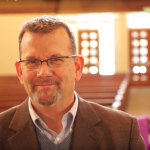Re-Enchanting Worship:
Beauty, Heavenly Participation, and Worship Renewal
By Dr. James R. Hart, President
The Robert E. Webber Institute for Worship Studies
How does earthly worship participate in the beauty of heavenly things, and what does this have to do with worship renewal?
 In my presidential address in January 2018, I explored the role of objective beauty in worship. In the June 2018 address I expanded on that, riffing a bit on the subjectivity of beauty in light of the topic (Enchanted Worship) being addressed by our guest seminar speaker, Dr. Hans Boersma, and starting a conversation on the “so what” of all of this.
In my presidential address in January 2018, I explored the role of objective beauty in worship. In the June 2018 address I expanded on that, riffing a bit on the subjectivity of beauty in light of the topic (Enchanted Worship) being addressed by our guest seminar speaker, Dr. Hans Boersma, and starting a conversation on the “so what” of all of this.
In the January 2018 presidential address, I began with the idea that the world seems to be increasingly ugly, connected to the effects of addictive sin, manifested in the pursuits of power, money, pleasure and pride. Added to this is the growing intolerance and hostility of secularism toward any faith, but in particular the Christian faith. While I do not believe in an ontological separation of the sacred from the secular, there yet seems to be a growing distance between people and communities of faith and those who privilege such ideals as rationalism, scientism, narcissism, individualism, relativism, racism, sexism, nationalism, consumerism, violence, sexual immorality, oppression, idolatry, greed and generally a culture of death. These militate against the sacred, specifically the story of the Triune God and its fulfillment in Christ and His mystical Body, the Church. . . .
My thesis in January was that the role of objective beauty in worship is the communication and application of the truth and goodness of God that fires our hearts and souls with an intense love of God, and therefore an intense love of all humankind. We participate in God’s beauty and glory by giving attention to the full employment and embrace of objective aesthetics in our liturgies, our preaching, in all of our worship arts, and in our handling of scripture through interpretation and presentation, especially in our attempts to re-enchant the Gospel with wonder, awe and beauty revelatory of Jesus Christ. Additionally, we are called to live virtuous lives of beauty, filled with the Holy Spirit and participating fully in God’s goodness and truth through Jesus Christ our Lord. That beauty is alluring and winsome to our world that is so devoid of such beauty, and living lives of beauty, goodness and truth is truly the only hope for our darkened days.
IWS founder Bob Webber wrote the following in The Younger Evangelicals: “Plato declared, ‘Beauty makes truth splendid.’ Beauty, whether it is that of an individual, a place, a landscape, or an environment, has the power to communicate a sense of well-being. Beauty is the eyesight of insight.”[1] Later in that same book, he relates the story of Prince Vladimir of Kiev, who sent a delegation of followers to discover true religion. After travelling abroad, the team discovered the goal of their search at Hagia Sofia church in Constantinople. They reported, “We knew not whether we were in heaven or on earth, for surely there is no such splendor or beauty anywhere upon earth. We cannot describe it to you: only this we know, that God dwells there among men, and that their service surpasses the worship of all other places. For we cannot forget that beauty.”[2] Webber commented that this statement points to “the unity between form and spirit in the beauty of God’s creation.”[3] This concurs with Balthasar’s perspective that objective beauty is the simultaneous encounter of form and splendor.
However, this overview of objective beauty raises a question—is the beauty we experience truly objective? I think there is a sliding scale of subjectivity to objectivity in the beauty we encounter, subjective personal preference if you will, on one end, to a more objectively and perhaps widely accepted aesthetic on the other hand. Here is the problem—we live in an analogical, sacramental world, a world created freely by God from what? Nothing! (Creatio ex nihilo.) Rev. 4:11 states, “You are worthy, our Lord and God, to receive glory and honor and power, for you created all things, and by your will they were created and have their being” (NIV). The Psalmist exclaims, “O Lord, how manifold are your works! In wisdom you have made them all” (Ps. 104:24a, NRSV). In Rom. 4:17b, the God of Abraham “gives life to the dead and calls into existence the things that do not exist.” So God created everything that is ex nihilo, from nothing. Therefore everything that is, both in this world and in every universe or multiverse that exists, animate and inanimate, naturally occurring and man-made, is necessarily insinuated with the Creator.
[1] Robert E. Webber, The Younger Evangelicals: Facing the Challenges of the New World (Grand Rapids, MI: Baker Books, 2002), 66.
[2] Ibid., 212.
[3] Ibid., 212.
